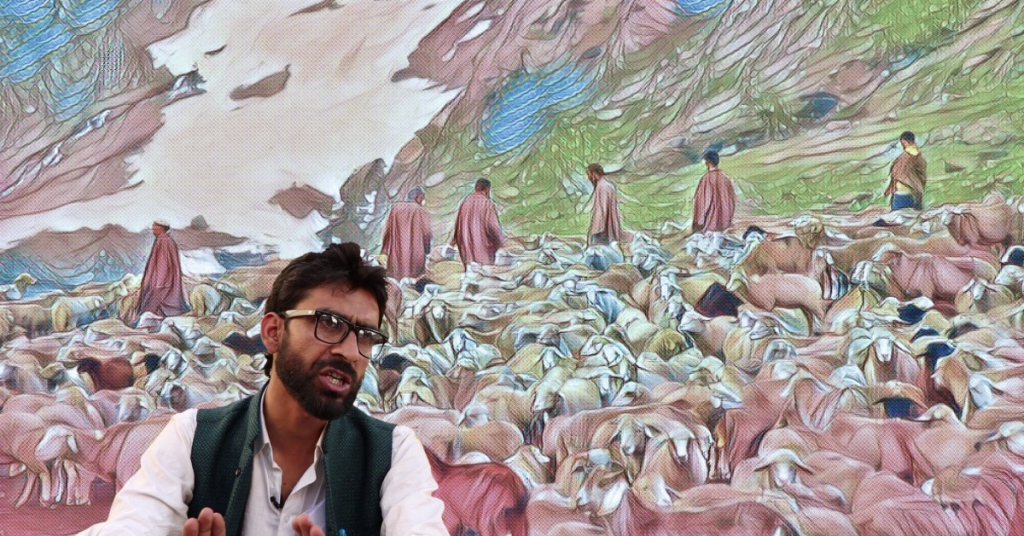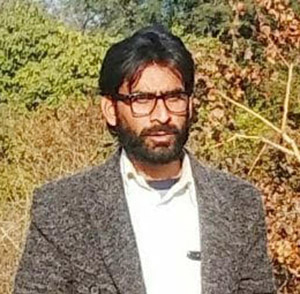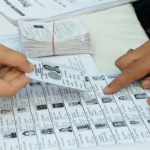
EXCLUSIVE! Implement Forest Rights Act to Protect Bakarwals of Kathua: Talib Hussain The young lawyer-activist tells us what is required to empower the vulnerable nomadic community
19, Apr 2018 | Sushmita
Could the deliberate alienation of Bakarwals from Jammu’s forest lands be one of the underlying factors that led to the brutal rape and murder of a little girl in Kathua? Talib Hussain, the firebrand lawyer and activist, who has been at the forefront for the struggle for Justice for the little girl, talks to us about the relevance of implementing the Forest Rights Act, 2006 for the nomadic and tribal communities and how it is inherently linked to the questions of vulnerability of these communities.
“If the tribals and nomadic communities had basic rights over forest land, the little girl would not be so vulnerable,” says Chaudhary Talib Hussain. With rage against the Kathua rape pouring in from all corners of the country, Hussain juggles his campaign responsibilities and media interactions such as this one with both grace and humility. Just like his elegant protest demanding forest rights for the nomadic and tribal communities in the state of Jammu and Kashmir.
CJP has been supporting various movements and campaigns by farmers, forest workers and adivasis for the implementation of the Forest Rights Act. To help us in our quest for justice, Donate Now.
Being a tribal, a Bakarwal himself, Hussain has been walking barefoot for the past four and a half months as a part of his campaign for implementation of Forest Rights Act, 2006 in Jammu and nearby areas. “If the implementation of the Act is not possible in its current form then we ask for the enactment of a similar Act.” Here the state Assembly is responsible for creating new laws.
“Like the FRA 2006 gives tribal and nomadic communities certain, very basic rights essential for their survival, we don’t have anything like that here, in Jammu,” he says. “Most important for us, as nomadic communities, is the right to graze our cattle. People misunderstand our demand and wonder if we want to grab land. But that’s not true. We are dependent on our cattle and we want some rights over Forest lands in order to be able to graze them,” he asserts.
Traditionally, Gujjars were responsible for dairy business, while Bakarwals took care of the cattle. “As March approaches, many of our tribes-people start moving towards Kashmir and live in the orchards of Kashmiris and beg there for survival. This needs to change,” he says highlighting the plight of the nomadic community. The Muslim Gujjar-Bakarwals, who constitute 11 percent of the population are very vulnerable in these areas. More recently, there has been a spurt in the number of systematic assaults on the community to drive them away from Hindu dominated areas such as Jammu, Kathua and more.
Government order against displacement
In February 2018, soon after the Kathua incident, Mehbooba Mufti passed an order saying that no member of the Gujjar-Bakarwal community should be dislocated till the state puts a tribal policy in place. The order stipulated the conditions of eviction saying, “if the eviction of members of this community from forest land was ‘absolutely necessary’ it should be done only after consulting the state’s Tribal Affairs Department.”
The order met with accusations of “Islamic expansion” in the state that was “sanctioned by the state government”, and that the government of India was “either ignorant [about it] or a collaborator.” This was a bizarre stretch of logic by lawyer Ankur Sharma who announced the order.
However the order only had powers to stop temporary dislocation till the government could think where to relocate them, and it did not allow tribals to stay anywhere they wished.
Activists who have been active in the struggle for rights of tribals feel that the only way to secure “the rights of the state’s landless tribal community was to implement the Forest Rights Act, 2006, in Jammu and Kashmir.”
The Politics of Displacement
Deliberate and planned attempts to push the nomadic community to leave Jammu region began soon after the alliance between BJP and PDP was forged in March 2015. Several evictions were carried out in Muslim-dominated areas of Jammu city. A young Gujjar man was shot dead in 2016 as residents of a Gujjar settlement in Sarore in Samba district resisted Hindu mobs attempting to drive them out of their homes.
Interestingly, to fulfil its agenda, BJP also selectively invokes the Article 370 in this case, which otherwise, it is keen on getting abrogated. Because of Article 370, the laws applicable in India can only be applied in the state of Jammu and Kashmir if they are ratified by the state assembly. Hence the BJP had been trying to make use of this aspect in order to ensure that attempts to implement FRA 2006 don’t succeed.
More recently, one of the two BJP ministers Lal Singh who participated in the rally taken out to support the accused persons in the Kathua case, had earlier threatened a Gujjar delegation to recall 1947, referring to the massacre of Muslims in Jammu that year.
All of these facts build a solid ground about how BJP wants this community pushed out of Jammu and the extent to which it is willing to go for this.
State’s tribal activists including Talib and Javed Rahi believe that the restrictions of Article 370 and the state’s special status is merely a shield for its “communal agenda” of evicting nomadic tribal communities mainly from the Hindu dominated districts such as Jammu, Kathua, Samba and Udhampur.
Talib Hussain’s Journey

“I was an activist first and then I became a lawyer,” he says explaining his journey. Hussain was a student activist during his days in the Jammu University. He founded the Gujjar Bakarwal Students Welfare Association in 2012.
In 2013, Hussain went on a hunger strike while still pursuing law at the university. “Though the Godhri and Pahadi Research Centres were approved by the University Council in 2002, even by 2013 these were not facilitated.” He was attacked by groups leaning to the right and implicated under several section of the Ranbir Penal Code (RPC) including section 307 (Attempt to Murder), along with five other girls for campaigning for the rights of tribal students.
“I felt there was a need to have an independent students’ body which was not the extension of any political party. The problem with being such an extension is that one has to fall into party line and stick to their ideology. That time there was a students’ group leaning towards Congress and we wanted autonomy” But why were independent students’ bodies needed in the first place? He says, “We wanted to create pressure groups. You can’t act like a pressure group if you are part of a party.”
Hussain was rusticated for two years from 2013-15 and could only join after a court order from the Jammu and Kashmir High Court. After finishing law school, Hussain went through another difficult phase in life. His parents drowned in a flood in Dooru in September 2014. His less than six months old marriage that his parents fixed, broke down and he separated from his wife.
He worked in Delhi High Court for five months and joined the Bar there. However, soon after he heard of cases of tribal and nomadic women going through various oppressive measures of the state he thought of returning. “I was compelled to come back for my people,” he says. After coming back to Jammu in 2017, he founded the All Tribal Co-ordination Committee and was democratically elected as the Chairperson of the Committee.
Everyday survival and Bakarwal children
Sheikh Abdullah, the chief minister of Jammu and Kashmir gave rights to the Bakarwals to stay in forests and rights to use forest produce, in 1975. The Bakarwals shared almost a symbiotic relationship with their neighbours who were Rajputs in many cases. The Rajputs would often look after their livestock and belongings left behind during the period they would migrate.
Along with this kind of a relationship, many provisions such as mobile schools were introduced for them considering their integral role in the economy as well as the social structure of the Jammu Kashmir area. However, today many of these schools are stationary. Talib feels that it is important that through the legalisation of rights of nomads and tribals over forests, these basic rights such as right to education and its implementation must also be taken seriously.
However, the current opportunistic alliance of BJP-PDP doesn’t seem too keen on their welfare. In fact, far from that, ministers like Lal Singh, at senior and responsible positions of the government are actively taking measures to push and perish out the community which is already at the periphery of the social fabric of Jammu and other nearby areas.
That is why, when the Kathua incident took place, none other than the parents themselves had to circulate the little girl’s photographs as a symbol of protest. So that “everyone comes to know about this merciless act”, said rhe little girl’s father.
It remains to be seen now, the measures the government will take to safeguard this community, if at all.
Related:
Outrage spills outside Kathua and Unnao










